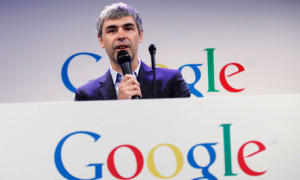MediaGuardian Lists Digital Consumer as Most Powerful Industry Figure
MEDIA, 2 Sep 2013
Annual ranking reflects mobile and social media’s transformation of sector long dominated by moguls, editors and celebrities.
MediaGuardian 100 – 2013: full coverage

Google’s CEO, Larry Page, was second in MediaGuardian’s list, which also included Twitter, Facebook, Apple and Amazon bosses in the top 10. Photograph: Reuters
The digital consumer – listed as “you” – tops MediaGuardian’s annual ranking of the UK’s 100 most powerful industry figures this year, reflecting the extent to which mobile and social media are transforming an industry traditionally dominated by moguls, editors and celebrities.
The Woolwich murder, Boston bombings and more recently the Syrian chemical weapons massacre demonstrated the extent to which ordinary members of the public, using smartphones and social media, are shaping coverage of major news stories these days.
“You” also reflects how online consumers – interacting, sharing content and shopping via mobile devices – are driving the UK digital economy, which is growing at more than 10% a year and which it is estimated by Boston Consulting Group will be worth £225bn by 2016. “Both as the audience and creators of content, it’s all about people power,” the MediaGuardian 100 panel concluded.
However, following the revelations by the NSA whistleblower Edward Snowden about the communications monitoring activities of the US and UK security agencies, the digital age’s potential to empower also comes with a sense of exposure and growing prospects of surveillance.
The selection of tweeters, posters and electronic shoppers marks a break with tradition for the list, which is in its 13th year. Lord Hall, the BBC’s director general, is the highest traditional new entry in the 2013 MediaGuardian 100, published on Monday, reflecting the power that the boss of Britain’s national broadcaster has at an organisation whose former leadership was decimated by the Savile scandal. Sheryl Sandberg, Facebook’s chief operating officer and author of Lean In: Women, Work and the Will to Lead, is the highest placed woman on a list dominated by the representatives of large tech companies. Google’s Larry Page, at No 2, heads the group, which also includes Twitter’s Dick Costolo (4), Sandberg (5), Apple’s Tim Cook (6) and Amazon’s Jeff Bezos (7), fresh from his surprise acquisition of the Washington Post.
Rupert Murdoch returns to the top 10 – having been excluded for the first time the year before – following a year in which his media empire tried to put the phone hacking scandal behind it by separating its publishing businesses from its film and TV assets at 21st Century Fox.
New entries include recently appointed BBC1 controller Charlotte Moore, former Labour culture secretary James Purnell, who joined the BBC as director of strategy, new Sun editor David Dinsmore and Mishal Husain, who is to become the Radio 4 Today programme’s second woman presenter. Broadchurch star Olivia Coleman and writer Chris Chibnal also make their MediaGuardian 100 debut.
Clare Balding, who has capitalised on her star turn as a London 2012 Olympics and Paralympics host with several new TV and radio presenting jobs, is one of this year’s highest climbers; while David Karp, 27, who sold his blogging site, Tumblr, to Yahoo for $£1.1bn, is the youngest on the list
Departures include Dame Marjorie Scardino, the former long serving chief executive of Financial Times owner Pearson, ex Sun editor Dominic Mohan, and The Apprentice host and entrepreneur Lord Sugar..
Go to Original – theguardian.com
DISCLAIMER: The statements, views and opinions expressed in pieces republished here are solely those of the authors and do not necessarily represent those of TMS. In accordance with title 17 U.S.C. section 107, this material is distributed without profit to those who have expressed a prior interest in receiving the included information for research and educational purposes. TMS has no affiliation whatsoever with the originator of this article nor is TMS endorsed or sponsored by the originator. “GO TO ORIGINAL” links are provided as a convenience to our readers and allow for verification of authenticity. However, as originating pages are often updated by their originating host sites, the versions posted may not match the versions our readers view when clicking the “GO TO ORIGINAL” links. This site contains copyrighted material the use of which has not always been specifically authorized by the copyright owner. We are making such material available in our efforts to advance understanding of environmental, political, human rights, economic, democracy, scientific, and social justice issues, etc. We believe this constitutes a ‘fair use’ of any such copyrighted material as provided for in section 107 of the US Copyright Law. In accordance with Title 17 U.S.C. Section 107, the material on this site is distributed without profit to those who have expressed a prior interest in receiving the included information for research and educational purposes. For more information go to: http://www.law.cornell.edu/uscode/17/107.shtml. If you wish to use copyrighted material from this site for purposes of your own that go beyond ‘fair use’, you must obtain permission from the copyright owner.